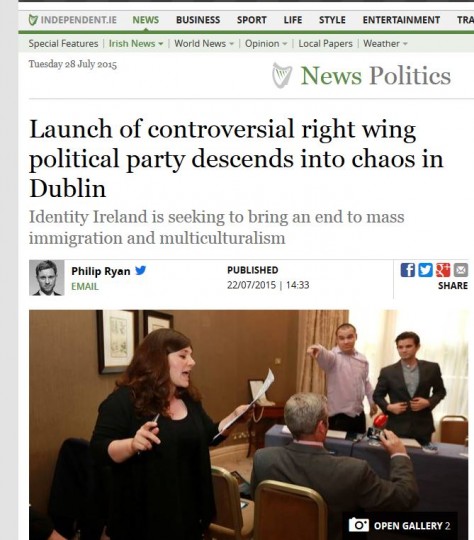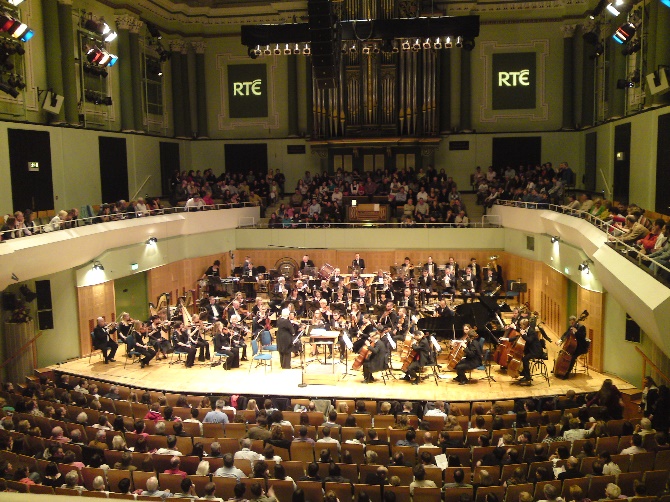
Migration is a human rights issue. The universal declaration of human rights outlines that humans have a right to social security, a right to work, a right to an adequate standard of living and a right to an education. People who find themselves in countries where these rights are not being met may have to migrate to another country where they have a hope of having these rights vindicated.
Ireland ranks the 11th most developed country in a world of over 190 countries. We have it pretty good in comparison to everyone else. Yet we would refuse these human rights to immigrants should its newest party Identity Ireland get its way.
On top of a suite of anti-Euro, anti-regulation authorities, anti-austerity measures Identity Ireland are proposing further border controls and deportation policies, including:
‘Economic migrants must be capable of supporting themselves when looking for work. If migrants become incapable of supporting themselves they should be offered short term social assistance depending on how long they have worked (if they have worked). Once this ends they should be deported.’
If Ireland isn’t able to guarantee everyone their basic human rights we should ship them elsewhere and we shouldn’t lose a wink of sleep about it. Why should we worry? They aren’t Irish after all?
Ignoring all of the benefits we get from immigrants who choose to come to Ireland (such as cultural diversity, filled labour gaps, friends, new skills, talents, perspectives and experts… to name a FEW) isn’t there an ethical and moral question we must ask ourselves regarding this issue?
Is it fair that just because of someone’s country of origin they deserve less human rights than people in Ireland?!
Is that how Ireland conducts itself? I will come back to this point in my conclusion.
Let’s examine the party’s leader Peter O’Loughlin for a second. Peter used to be a member of another new party National Independent Party (NIP), which styled itself on British anti-immigration party UKIP. Like UKIP, NIP also hammer anti-immigration sentiments into their policies, the best example of which is regarding overseas aid:
‘As a nation facing the worst fiscal crisis and social meltdown since the foundation of the State, it’s of grave concern to many that we cannot manage our own meaningful poverty supports adequately enough; let alone divert in the region of 630 million in overseas aid. Given the recent cases of miss-appropriation of funds, we feel this raises additional questions as to our present role. The NIP proposes we reduce our programme by 80% for at least a 5 year period. We propose to use the reduced aid budget more efficiently by targeting aid to specific problem areas instead of providing blanket aid.’
What they are saying is the people in receipt of Ireland’s aid aren’t Irish, and regardless of their needs they aren’t as important as Irish people.
To put this theory into practise, Ireland’s international agreement under the MDGs should have been €1.1 billion in 2014. We gave €614.86 million. Under NIPs figures we should’ve only given €123.6 million. To put THAT into context, RTE, between 2006-2011, have spent €100 million of taxpayer’s money on orchestras.
NIP put the same value on tackling anti-poverty programmes targeted at millions of the world’s poorest that RTE do to orchestras.

So back then to their spokesperson O’Loughlin.
Why did Peter leave the NIP? Because ‘it didn’t work out’. What a luxury! When Peter felt that the NIP was not meeting his needs anymore he was able to migrate to another party. It’s a pity he doesn’t want to extend that sentiment to people who feel that Ireland would provide a safer, happier place for them to work and their families to live.
So are Identity Ireland’s values compatible within the Republic of Ireland?
I think I’ll quote from Identity Ireland’s own website to say that with regard to their attempts at shifting common values and standards that we should take a ‘Zero tolerance approach towards demands to alter national life, culture and traditions to accommodate minority held beliefs and cultures.’ Identity’s policies have drawn instant ire from anti-racism protesters as they actively disrupted the registration of Identity Ireland with the Dáil last week. Furthermore, the party’s head honcho Peter failed to get elected in the 2011 European election, and failed to win a seat in the Carlow Kilkenny by election earlier this year. Clearly then, Irish people do not support this shift in our culture towards one of intolerance.
Ireland is a place of welcome, openness and facilitating relationships that our mutually beneficial. As our own president put it when greeting Ireland’s refugees only last month:
‘Those who have come have changed our country in remarkable ways, they have enriched our culture and our community, and they have enhanced all of our lives.’
We have always strived to treat those who come to our shores with open arms, as we know all too well what it’s like to need to leave your country. After all, following seven years of austerity don’t most of us know someone who’s living in Canada or Australia? We can’t let the small few blame our friends from other countries for the problems we all face together in Ireland. We might have many problems, but immigrants searching for a better life isn’t one of them.
